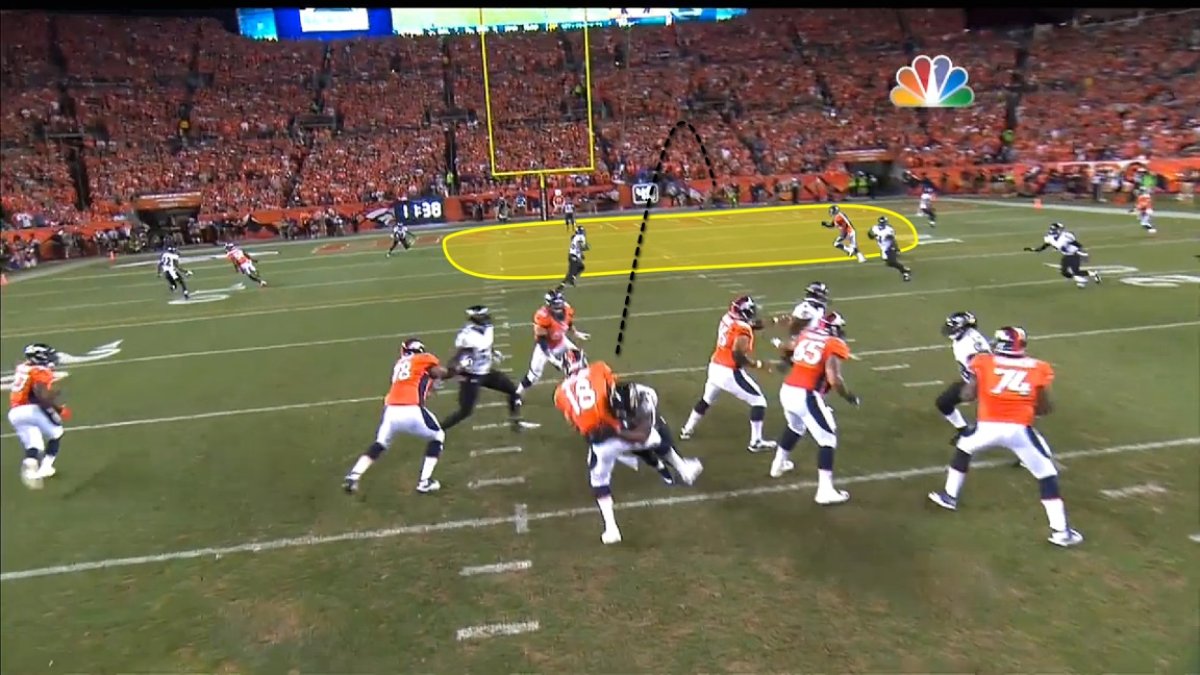Somehow it seems fitting that Peyton Manning adds to his ever-expanding list of records and achievements in the NFL by tying the all-time single-game record of seven touchdown passes. There is no surer sign of football returning than a Manning touchdown pass, let alone seven of them.
One of the first things I was asked to check in our Analysis Review session of this game was the first of those touchdowns thrown by Manning, and what I found was one of the prettiest play designs you will see all year, and it happened just 18 minutes into the regular season.
Many of the plays we choose to highlight in our Analysis Notebook feature outstanding individual performances, or new and innovative schematic changes that force a win for one side or the other, and it's often easy to overlook simple, outstanding play design. This is an example of how one play has been designed to open up a yawning chasm in the defense by forcing defenders to react to one thing and then hitting them with something else entirely. The Broncos execute it to perfection and Manning naturally takes advantage. So let's take a look at how it unfolded.
Baltimore Ravens @ Denver Broncos, Opening Day, Q2, 11.40.
It all starts on the right side of the Denver formation with a simple bubble-screen fake. The Broncos fake the quick pass to RWR Eric Decker which starts the dominoes tumbling on the Ravens' defense. When teams run this kind of screen pass the defensive secondary usually has to orchestrate a quick switch between the outside corner and the slot corner to his inside. The offense will usually try to block the guy lined up over the intended receiver with the slot receiver, leaving the inside corner as the man with the unblocked path to the ball. When Denver shows this fake, both corners make for the football, with LCB Lardarius Webb shooting at speed to try and beat the anticipated block from Wes Welker, and slot corner Corey Graham coming up to shut it down from the inside.
The problem is that Welker isn't planning to throw a block at all, he's running his own route. He takes a path towards Webb as if to block but then breaks deep towards the end zone. This topples another domino.
 With both corners now out of the picture, the safety to that side of the field, Michael Huff, sees the danger immediately and knowing he has help to his inside, takes off to try and prevent an easy pitch and catch to Welker by the pylon. Unfortunately, doing this takes him out of his zone, and opens up a huge hole to the middle of the field, just waiting for a Denver receiver to break into. The deep is supposed to be covered by two deep safeties splitting the field in half, but there is no way the backside safety can know Huff has been dragged out of position and move across to fill the gap. The play is designed to pull just one side of the defense out of alignment, because that's all it needs to do.
With both corners now out of the picture, the safety to that side of the field, Michael Huff, sees the danger immediately and knowing he has help to his inside, takes off to try and prevent an easy pitch and catch to Welker by the pylon. Unfortunately, doing this takes him out of his zone, and opens up a huge hole to the middle of the field, just waiting for a Denver receiver to break into. The deep is supposed to be covered by two deep safeties splitting the field in half, but there is no way the backside safety can know Huff has been dragged out of position and move across to fill the gap. The play is designed to pull just one side of the defense out of alignment, because that's all it needs to do.
For this play to work, Denver still needs one more domino to fall, and it comes in the form of the underneath man coverage of LB Daryl Smith, a perennial PFF favorite.
Smith reads the out pattern by the TE Julius Thomas, but doesn't react well enough when he turns the route into an out-and-up. Just as the pressure gets to Manning he delivers the perfect pass into a huge area of space in the middle of the Ravens' defense. The touchdown ends up right in the center of the field, and the player with the biggest portion of blame on that defense is Smith, who was beaten by his man in coverage. However, the elegance of the play design has taken at least three other defenders out of position and caused that huge area of uncovered space in the middle of the field making it an easy throw for Manning to make, even with an imminent hit coming right at him.
We're only one game into the new 2013 NFL season, but it may be some time before you see a play design as simple and refined as this.
Follow Sam on Twitter: @PFF_Sam





 © 2024 PFF - all rights reserved.
© 2024 PFF - all rights reserved.